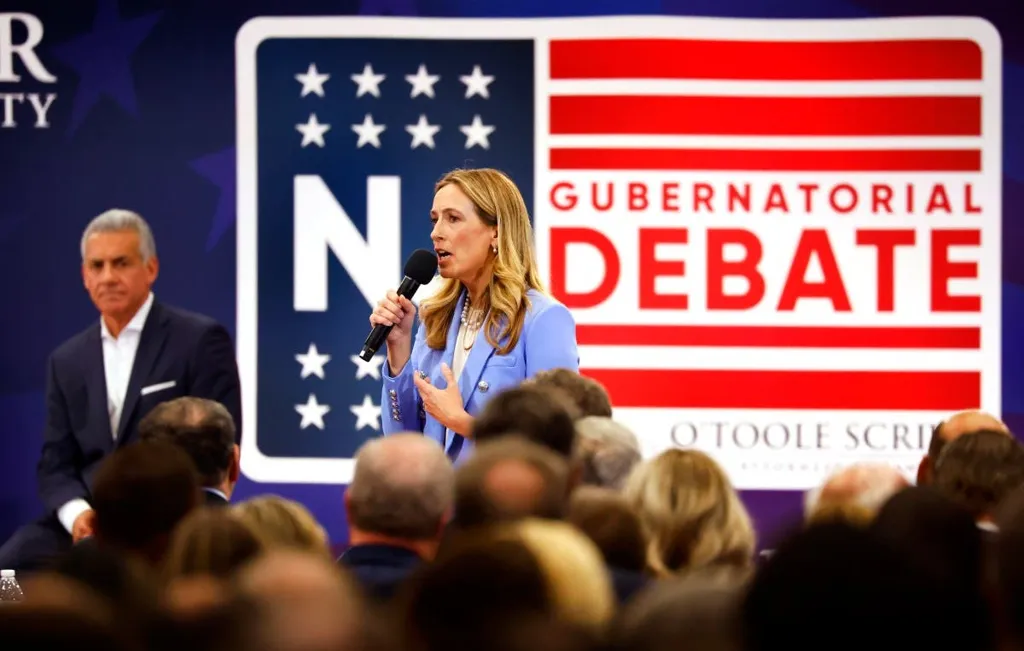Democratic U.S. Rep. Mikie Sherrill's campaign for governor in New Jersey was thrust into turmoil this week after largely unredacted military records were disclosed to an ally of her Republican opponent. The documents, released by the National Archives, included disciplinary information and reportedly revealed that Sherrill was barred from walking at her 1994 U.S. Naval Academy graduation for declining to inform on classmates involved in a cheating scandal.
The leak has triggered fierce backlash from Democrats, who accuse the Trump administration and its allies of weaponizing government records against a political rival. House Minority Leader Hakeem Jeffries called for a criminal investigation, saying the release may have violated federal privacy laws. In turn, Sherrill's campaign blamed her opponent, Republican Jack Ciattarelli, saying the distribution of her file reflects a "coordinated political assault."
In a tight general election contest, the release of Sherrill's military file raises serious issues around personal privacy, due process, and the role of government in political campaigns. While New Jersey's governor's contest often draws national interest, the controversy adds a volatile layer to an already high-stakes race.
The controversy also spotlights broader questions about how archives, federal agencies and oversight bodies manage sensitive personal and military records, and whether political motivations influence those processes.
The released documents included Sherrill's Social Security number, internal correspondence, and information about her Naval Academy record. The Academy documents indicate she did not participate in her class's 1994 graduation, a decision linked to her refusal to implicate classmates who cheated on an electrical engineering exam -- a scandal that ensnared scores of midshipmen. The Sherrill campaign contests that the disciplinary file had been sealed and not subject to public disclosure.
The National Personnel Records Center responded to the uproar saying it would review internal procedures and that the disclosure was inappropriate. Jeffries and others claim that the former Department of Defense and National Archives staffers implicated in the release should be held accountable.
In addition to the military record scandal, Ciattarelli has attacked Sherrill over her financial disclosures and stock trades, painting her as someone who has profited from insider knowledge while in Congress. The debate between the candidates has touched on those issues, as well as broader themes such as Trump's influence, taxes and New Jersey's identity politics.
Sherrill posted on X, This is an illegal and dangerous weaponization of the federal government. That @Jack4NJ and the Trump admin are breaking the law and exposing private records for political gain is a violation of anyone who has ever served. No veteran's record is safe.
Ciattarelli posted on X, "Today's admission by Congresswoman Sherrill that she was implicated in, and punished for, her involvement in the largest cheating and honor code scandal in the history of the United States Navy is both stunning and deeply disturbing. For eight years, Mikie Sherrill has built her entire political brand around her time at the Naval Academy and in the Navy, all the while concealing her involvement in the scandal and her punishment. The people of New Jersey deserve complete and total transparency."
California Democratic Gov. Gavin Newsom posted on X, "The Trump administration has ILLEGALLY released the private military records of the Democratic nominee for NJ Governor, Mikie Sherrill. They cheat, lie, and rig because they know they are going to LOSE. We have to keep calling it out."
The fallout is likely to continue in the final weeks before the November election. Sherrill's team is exploring legal options to challenge the legality of the disclosure and may pressure oversight bodies in Congress to investigate. Federal committees overseeing military records and national security could also initiate probes into how the archival breach occurred.
If the courts find the release violated privacy or archival law, there may be significant ramifications for how government agencies handle personal records, especially in politically charged contexts.
